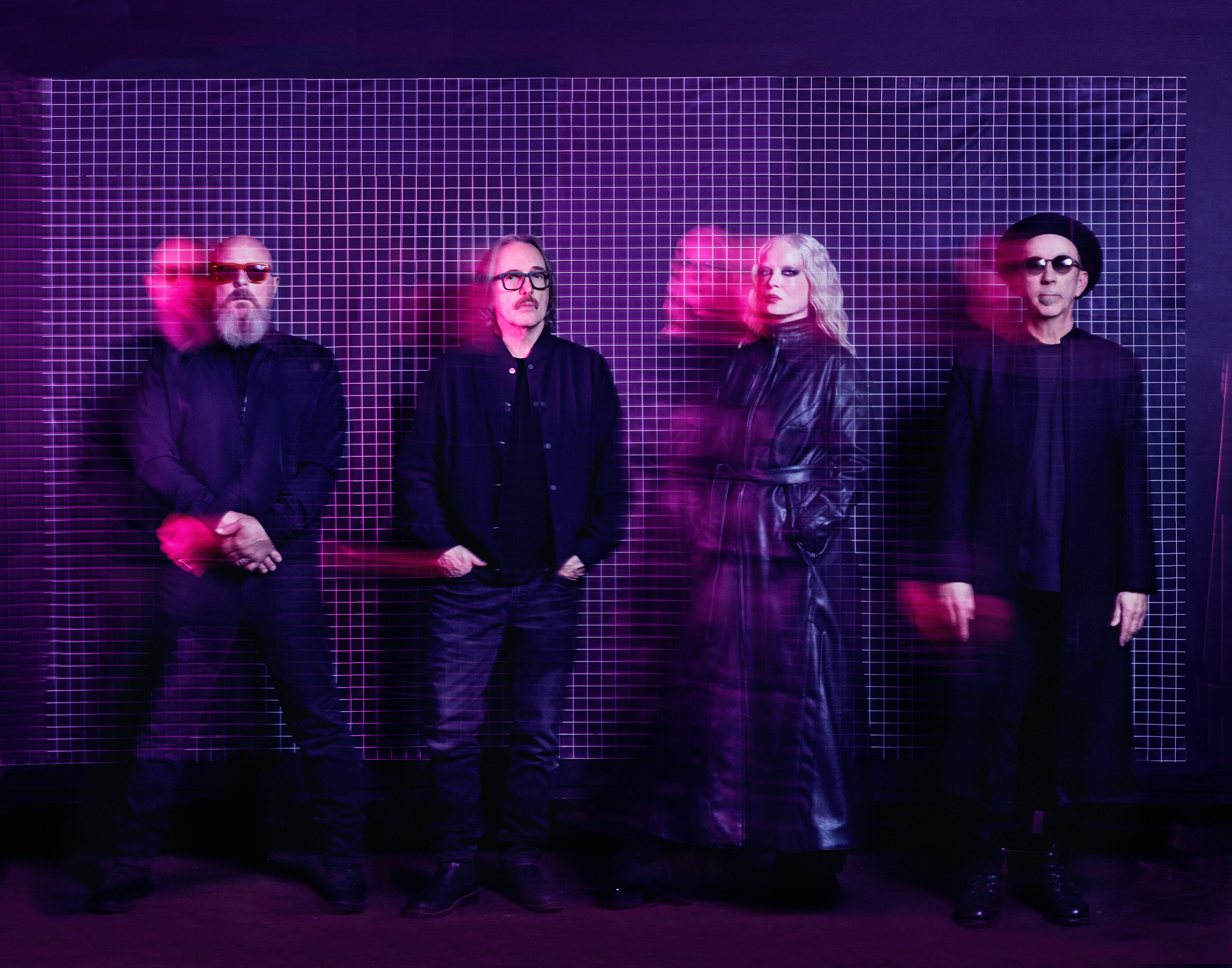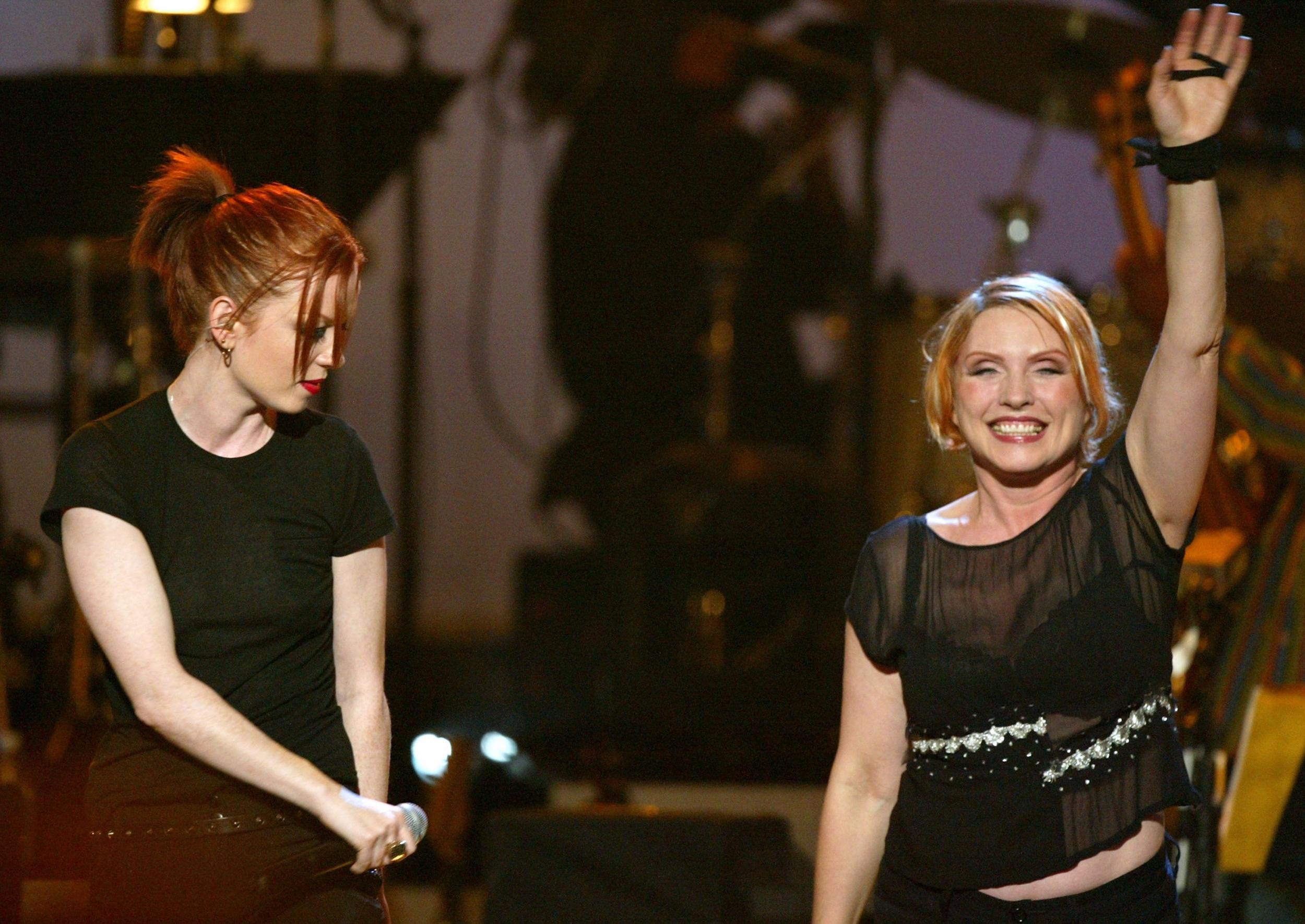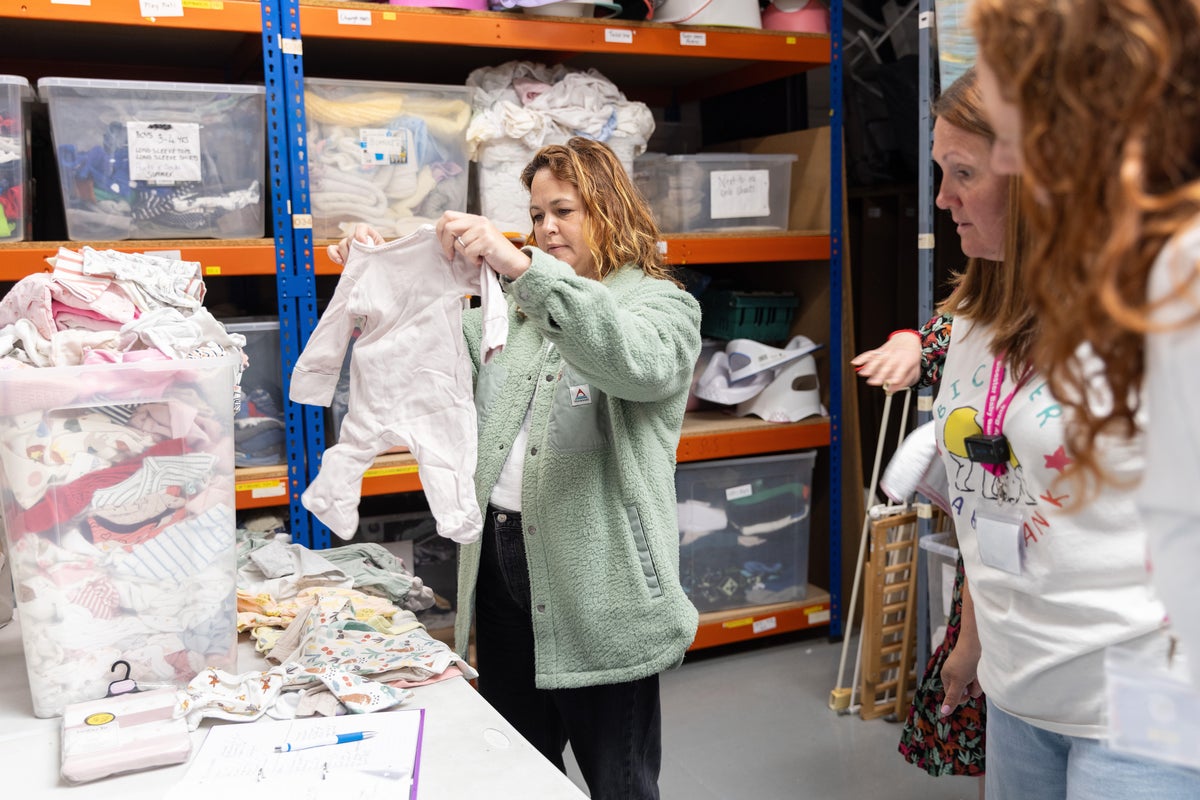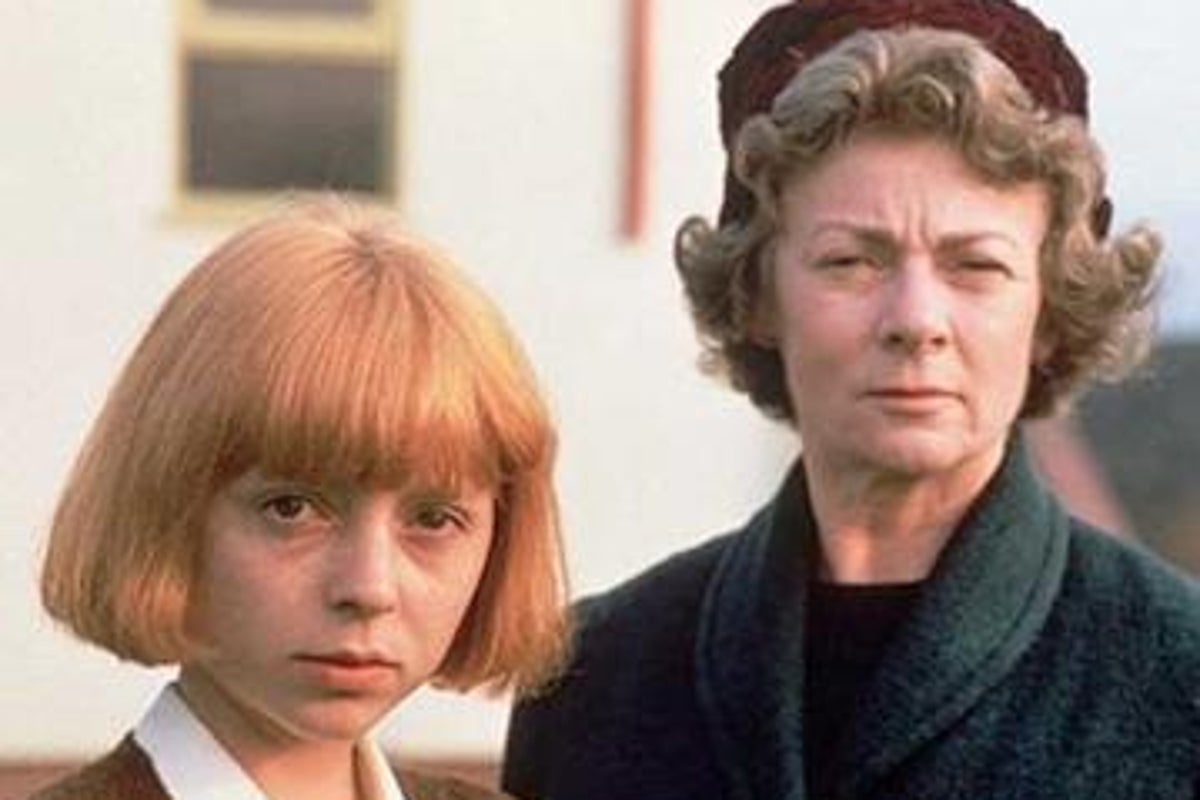When a certain British tabloid trotted out some of its ageist clickbait last month, Shirley Manson was having none of it. Out came an article claiming that her band, Garbage, “look unrecognisable” in their new promotional images. Two years earlier, the notorious news site ran the same headline about her while she was on holiday. “So I knew it was directed at me,” says Manson. The singer called it out on Instagram to a tidal wave of support: “I’m nearly 60 years old. Of course I’m not going to look anything like my late twenties self?!?” she wrote. “I shall continue to age as I am… and no matter what they say about me, I will always – and forever – rock HARDER than most.”
Manson has rarely held back, either musically or personally. Since Garbage’s 1995 self-titled debut, she’s become one of alternative music’s most enduring figures with era-defining hits like “Stupid Girl”, “Queer”, and “Only Happy When It Rains”. Fame hasn’t come at the expense of her principles either, and she speaks openly about the injustices she sees and experiences. “When we released our last record,” she recalls of 2021’s biting comeback No Gods No Masters, “a male journalist and then a female journalist asked if I should be thinking about retiring.” She was 53. “My bandmates, who are older, have never been asked that. Men are not asked these questions.”
She channelled that fury into “Chinese Fire Horse” from Garbage’s eighth studio album Let All That We Imagine Be the Light, out this week. Like a warped glam-pop “My Sharona”, the song is a taunting kiss-off to ageist remarks (“Hell really hath no fury/ Like a Chinese Fire Horse/ With a 1966 birthday/ A sign not to be crossed”). When the article arrived, “I was rubbing my hands with glee,” Manson says. “I’ve written a song about that and you’ve just played right into my hands!”
The Scottish musician is sitting in a side room at Somerset House in London in early May, wearing the kind of sharp black tailoring that makes you want to set fire to your wardrobe. Beyond promoting the new album, she’s preoccupied with the silence around global atrocities. “What’s going on at the BBC?” she says. “I can’t believe that there’s so little coverage of Gaza, Ukraine, Sudan, Congo, Haiti. There’s been zero challenge to what is essentially a slaughtering on our phones. And then you look at Annie Lennox, who’s doing the work of responsible, seasoned journalists…” and using her platform to amplify news of the escalating situation in Gaza. “It’s wild.”
Manson uses her social media to raise awareness, too. Is it a lonely place to be? “It’s not lonely, it’s maddening,” she says. “There’s amazing people speaking up, but I’m also astounded by the apathy around me. So many people seem unwilling to challenge it.”
She recently signed a letter with Massive Attack, Primal Scream and others, defending Irish rap group Kneecap’s right to free speech after controversy over pro-Palestine statements at the Coachella festival. “I don’t understand why words out of the mouths of a young, rebellious rap band from Ireland [are] more dangerous than the slaughter of children,” says Manson. “They are being held more accountable than the Israeli government.” Since this interview, the group’s Mo Chara has been charged with a terror offence for allegedly waving a Hezbollah flag at a London show last November. “I don’t understand where people think this is going to go,” she says. “It’s the erosion of our democracy.”

While No Gods No Masters was a lacerating howl at, to give the opening track’s title, “The Men Who Rule The World”, Manson has attempted to “dampen” her “outrage” and reach for unity. “It’s perverse because I’ve moved through outrage,” she says. “Five years on, we’ve come to exactly the point where I figured we would end up. Let All That We Imagine… presents a dreamy gothic dystopia to match, although Manson says it’s only a reflection of what’s going on around them. “I don’t think I’ve brought the dystopia, the world has brought the dystopia.”
The political bent is still there – songs written in the wake of George Floyd’s murder, others continuing the theme of her horror at the patriarchy – but for her own sanity, Manson is trying to hold on to hope and searching for softness in hard times. “If you’re ready for love”, goes opener “There’s No Future In Optimism”. “I have had to ignite some positivity in my own mind, otherwise I wouldn’t get out of bed,” she says.
Manson knows all too well what that feels like. In the past few years, she was physically unable to get out of bed after having two hip replacements, culminating in her having to cancel a major live date at Wembley Arena and the remainder of Garbage’s tour. “I spent three years as an invalid, basically. I was bedbound towards the end.” With that loss of mobility came an identity crisis. This being an artist who, she sings on “Chinese Fire Horse”, will “take no s***”. “I’ve always been loud and I move through the world at great speed, I make decisions quickly,” she explains. “And then all of a sudden, I was stripped of all my dignity, shuffling around LA [where she lives with her husband, music producer Billy Bush] with a Zimmer frame, praying I didn’t bump into anybody who recognised me. I experienced deep shame, which I realise now is so pathetic.”
Enjoy unlimited access to 100 million ad-free songs and podcasts with Amazon Music
Sign up now for a 30-day free trial. Terms apply.
Try for free
ADVERTISEMENT. If you sign up to this service we will earn commission. This revenue helps to fund journalism across The Independent.
Enjoy unlimited access to 100 million ad-free songs and podcasts with Amazon Music
Sign up now for a 30-day free trial. Terms apply.
Try for free
ADVERTISEMENT. If you sign up to this service we will earn commission. This revenue helps to fund journalism across The Independent.
She worried that people would think “that I was vulnerable, that I was old, that my career was over. I felt I’d failed.” But she came out of it fighting, and reclaimed her sense of self: “I’ve got a much better relationship with my body now. I have two fully bionic hips – I’m Lindsay Wagner!” she laughs, “I actually think it’s sexy.”
Manson’s recovery shaped how the band made Let All That We Imagine…. She realised that she can’t “change the world” and had to focus on getting better. That aforementioned vulnerability is apparent in some of her lyrics, as she grapples with how to heal herself (and by extension, how society might heal itself as well). Her bandmates, Butch Vig, Steve Marker and Duke Erikson, would send Manson instrumental tracks as she recuperated, and she’d write words to whichever resonated. Though there was no shared studio time, Manson felt a renewed sense of freedom. “What we agreed to do was the band go off and create music together at my behest,” she says. “I was free to do whatever I wanted, as they were. After 30 years of doing the same f***ing thing, it felt liberating.”

Despite the tabloid’s jibe, it feels like a liberating era for older women in rock on the whole. Manson has noticed the shift, too. “Grace Jones, Chaka Khan, Patti Smith, Stevie Nicks,” she says, listing out just a few idols still bossing it. “They’re the first wave of women to enjoy a public career into their seventies and eighties. Humankind has never seen this before. Ever. It is so revolutionary, and there’s so little written about it. But these women are changing what is achievable.”
Manson says the culture of the Nineties ensured that her women peers didn’t bond together back then like they do now. “We’d all been taught there’s only room for one,” she says. “We all admired each other, but there was very little actual connection,” while lad mags pitted one against the other with “these ghastly ’who’s sexier?’ polls.” But she had Debbie Harry in her corner. When Garbage were dropped after 2005’s Bleed Like Me and Manson thought her career was over, Harry invited her to induct Blondie into the Rock & Roll Hall of Fame. “It was a real boost. She’s taught me a lot about how important it is as an ageing artist to reach out to younger artists and give them your support.”
Social media has accelerated the sisterhood, however, and the likes of Karen O, Peaches, Kathleen Hanna, Cat Power, Beth Orton and Skin regularly cheer the Garbage frontwoman on in the comments on her Instagram posts. “We’ve got what we call ‘a coven’,” says Manson, naming no specific names. “We talk about stuff that’s hard to communicate, stuff that you’re feeling on a cellular level: slights, pressures, frustrations, disappointments, failures, success, joy.”
Ordinarily, these topics might be up for discussion with your long-standing band. But Manson says not: “The band, I have very little communication with. I’ve just started talking about it because I feel like I’ve become so isolated. I don’t want to pretend everything’s hunky dory.” It feels like a bombshell, but it’s not at the separate tour bus stage, she says. “Nothing’s wrong with the band per se, but there’s very little proper communication about anything at all.”
After her mother’s death in 2008, Manson refused to keep being Garbage’s go-between. “I was the interface between the band and management; band and record company,” she explains. “I stopped doing it because I hit a wall and had to protect myself. And then the entire communication between us just… drifted away.” Their management once suggested therapy, which had worked for their other clients, Metallica, but it was too expensive. “£100,000, or something mad like that!” Now she’s let go of trying to fix it. “I have to let them be.”
“It’s not bad, though,” she continues. “I know that a lot of people will read it as a negative. I love my bandmates, they’re lovely men, but they’re a boys’ club, and I’ve never been part of that. We live very separate existences and identities – it could be the secret of why we’ve lasted 30 years!”

The Garbage origin story is well-told: in the mid-Nineties, three American guys were looking for a singer for their new, post-grunge venture. After producing seminal albums like Nirvana’s Nevermind and Smashing Pumpkins’ Siamese Dream, Butch Vig turned his sights on uniting industrial, trip-hop, early Sixties girl groups and guitars with cutting-edge production techniques. The trio had spotted a 27-year-old Manson from Edinburgh in a video with her band Angelfish and, impressed by her vocals, flew to London to meet her.
That same day, however, Kurt Cobain died by suicide, and Vig immediately returned to the States, so their meeting never happened. Later, Manson visited them in Vig’s hometown instead. She got the job, but says: “I was always separate from the second I joined the band, I’ve always been an outsider. We would work in the studio, and then they’d go to their homes in Madison, Wisconsin, and I would sit in a weird hotel with no money, no transport, nothing. It was freaky, but it’s been good for me.”
It’s ample fodder for a personal memoir, though she laughs off the suggestion – “Hilarious.” What about, finally, a solo album (she started writing one in the mid-2000s with producer Greg Kurstin and The Blue Nile’s Paul Buchanan)? Is she yearning to feel the excitement of IRL collaboration again? “But I do have excitement within Garbage,” says Manson, even though “it’s not the clichéd idea of how a rock’n’roll band works”. She has no intention of going it alone – quite the opposite. “I realise it’s not going to last forever, and we’re already running out of time, and so it feels very poignant and beautiful, and something that I want to protect.”
What ambition has she left for Garbage, having sold more than 17 million records worldwide and written a Bond theme? “I want us to survive,” she says. “But of course, death awaits us all. The end is always beckoning. I’m going to be 60 next year; my band is older than me. We’ve been so lucky to come this far with healthy bodies, healthy minds and a vigorous career, but who knows when the shoe’s going to drop?”
Not any time soon, going by recent footage of Garbage at the Cruel Summer festival in California in May. Manson is resplendent in an outfit of punky green tulle and frayed tartan by Matty Bovan, plus combat boots, commanding the stage with newly regained strength and power. “I’ve struggled my whole life with depression and as I’ve gotten older, that has receded,” she says, “I’m ignited every minute with [the thought of]: ‘Well, you better get off your arse, because you might be dead tomorrow’.”
‘Let All That We Imagine Be the Light’ is out now







